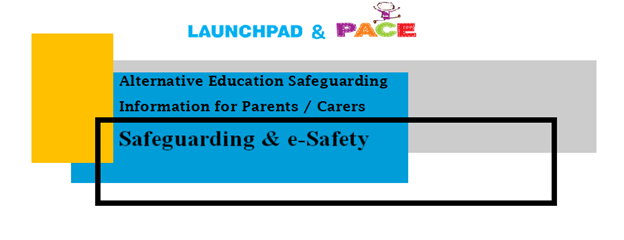Safeguarding & e-Safety

As part of the Alternative Provision Service's commitment to safeguarding the young people in our care, it is important that we keep parents and carers informed of significant and/or emerging issues that may impact on the well-being of their children.
Especially with regard to ‘e-safety’ (the range of fixed and mobile technologies that children and young people may encounter, now and in the future, which allow them access to content and communications that could raise issues or pose risks to their wellbeing and safety) it is often the case that children are far more familiar with the workings of technology and the latest developments than are adults. Please feel free to contact school if you require any assistance or guidance with regard to issues such as how to check your child’s mobile phone, laptop etc. in order to ensure that he/she is using these technologies safely.

Child Sexual Exploitation (CSE)
An issue that has been very much in the news in recent months has been the ‘grooming’ of young people by adults. Contact is often initiated on-line. You may wish to look at the following information:
- Spotting the signs of CSE http://www.knowandsee.co.uk/
- NSPCC information and advice about preventing CSE http://www.nspcc.org.uk/preventingabuse/child-abuse-and-neglect/childsexual-exploitation/
Preventing extremism and radicalisation
Extremism is not a new topic in education, but recent events and legislation require schools to be fully apprised with this area. This resources in the link below help to identify the elements common to all forms of extremism, whether that be Islamist or the far right, as well as giving information about online safety and the role of parents. http://counterextremism.lgfl.org.uk/

Cyber-bullying incidents using Instagram appear to have declined but not disappeared altogether.
A recent issue is playing “Trust Games”. Someone will put a post on saying “If you are my true friend you will post your passwords on here for me to see”. They then do this and everyone can get access to their account, with all of the resultant repercussions. INSTAGRAM is owned by Facebook and they are willing to assist law enforcement agencies.
IF the content/behaviour constitutes a criminal offence and is formally reported, (this MUST occur before the police are able to act). If incidents do not cross criminal thresholds, report to Facebook/Instagram in the usual manner by using the following link.
http://help.instagram.com/154475974694511

Like Instagram, SnapChat is a ‘photo messaging’ application available on Android and iPhone/iPod devices which allows video clips, images, text or drawings are sent to a controlled group of ‘friends’, who are invited to comment on it.
The image is only visible for a few seconds before it disappears from view, leaving no live evidence of what the image was – however, people are able to save a copy of what was sent and then share this via other forms of social media.
Recent reports suggest that the SnapChat Servers have been ‘breached’ and that hundreds of thousands of SnapChat images being available on the internet.
The App itself is harmless fun when used appropriately but can be used for less desirable purposes. In criminal cases it may be possible to recover the images and videos using forensic computing techniques.
You may wish to look at the following website to see the ‘Top 5 Questions Parents Have About Snapchat answered’
http://www.connectsafely.org/wpcontent/uploads/snapchat_guide.pdf

Please be aware of issues that have recently come to light both locally and nationally regarding a video chat App called ‘ooVoo’. This programme can be downloaded to electronic devices such as mobile phones, laptops, iPads or PCs and allows users to make free video calls, search for other users and send ‘invites’ to become ‘friends’. The terms and conditions for ooVoo state that users must be at least 13 years old.
There have been some recent cases in which adult males have allegedly set up false profiles, usually passing themselves off as teenage girls, and have then made contact with young females who have this app installed on their phones. There is some evidence that the profile pictures for these fake accounts are actually pictures of the girls then being targeted or of their friends – taken from things such as Facebook, Twitter and Instagram accounts - as this immediately grabs their attention.
Once contact has been made, the people behind the fake accounts have then sent sexually explicit videos of themselves and tried to encourage the person they have contacted to do likewise. Merseyside Police are currently investigating a number of cases but in the meantime we would advise you to discuss this issue with your daughter. ooVoo have been reported as co-operating with law enforcement requests to trace users and ban usernames. Users can set security controls to prevent uninvited contact and report other users through the ‘Support’ section of the App.
Use the following link to control security settings:
http://support.oovoo.com/link/portal/3908/4244/ArticleFolder/169/Privacy-Security
Reporting users to ooVoo can be done via this link:
http://support.oovoo.com/ics/support/ticketnewwizard.asp?style=classic
We intend hosting an e-safety briefing for parents and carers in school during autumn term 2015/16 in order to ensure that people are aware of any emerging issues. In the meantime, you may wish to look at the following website - www.net-aware.org.uk – a guide to the social networks used by young people, available from the NSPCC.





